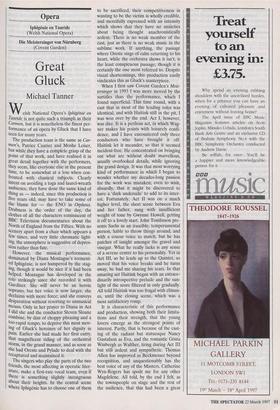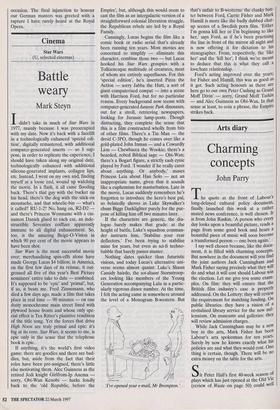Opera
Iphigenie en Tauride (Welsh National Opera)
Great Gluck
Michael Tanner
Welsh National Opera's Iphigenie en 7auride is not quite such a triumph as their Carmen, but it is nonetheless the finest per- formance of an opera by Gluck that I have seen for many years.
The production team is the same as Car- men's, Patrice Caurier and Moshe Leiser, but while they have a complete grasp of the Point of that work, and have realised it in great detail together with the performers, they seem, like everyone else at the present time, to be somewhat at a loss when con- fronted with classical subjects. Clearly intent on avoiding a toga and laurel-wreath ambience, they have done the same kind of thing as — indeed, since this production is five years old, may have to take some of the blame for — the ENO in Orpheus. Drabness is the order of the day, the Clothes of all the characters reminiscent of BBC Television documentaries about the North of England from the Fifties. With no scenery apart from a chair which appears a few times, and very little chromatic light- ing, the atmosphere is suggestive of depres- sion rather than fate.
However, the musical performance, dominated by Diana Montague's torment- ed Iphigenie, is not hampered by the stag- ing, though it would be nice if it had been helped. Montague has developed in the role strikingly since she recorded it with Gardiner. She will never be an heroic soprano, but her voice is now larger, she declaims with more force; and she conveys desperation without resorting to unmusical means. Only in her prayer to Diana in Act I did she and the conductor Steven Sloane combine, by dint of choppy phrasing and a too-rapid tempo, to deprive this most mov- ing of Gluck's heroines of her dignity in pain. Earlier she had made her first entry, that magnificent riding of the orchestral storm, in the grand manner, and as soon as she had Oreste and Pylade to deal with she recaptured and maintained it.
The singers who play the parts of the two friends, the most affecting in operatic liter- ature, make a first-rate vocal team, even if there is something slightly incongruous about their heights. In the central scene where Iphigenie has to choose one of them to be sacrificed, their competitiveness in wanting to be the victim is wholly credible, and mercifully expressed with an intensity which shows that they have no anxieties about being thought anachronistically ardent. There is no weak member of the cast, just as there is no weak music in the sublime work. If anything, the passage where Oreste sings of calm returning to his heart, while the orchestra shows it isn't, is the least conspicuous passage; though it is certainly the one most referred to. Despite visual shortcomings, this production easily vindicates this as Gluck's masterpiece.
When I first saw Covent Garden's Meis- tersinger in 1993 I was more moved by the surtitles than the performance, which I found superficial. This time round, with a cast that in most of the leading roles was identical, and with Haitink still in the pit, I was won over by the end. Act I, however, was dire. It is a perilous act, in which Wag- ner makes his points with leisurely confi- dence, and I have encountered only three conductors who have brought it off. Haitink let it meander, so that it seemed incident-free. He concentrated on bringing out what are without doubt marvellous, usually overlooked details, while ignoring the grand design. It was that most worrying kind of performance in which I began to wonder whether my decades-long passion for the work was mistaken; even to wish, absurdly, that it might be discovered to have a 'dark underside' to add to its inter- est. Fortunately, Act II was on a much higher level, the short scene between Eva and her father, sung with insufficient weight of tone by Gwynne Howell, getting it off to a lovely start. John Tomlinson pre- sents Sachs as an irascible, temperamental person, liable to throw things around, and with a coarse voice to match, but he has patches of insight amongst the gravel and vinegar. What he really lacks is any sense of a serene centre to his personality. Yet in Act III, as he leads up to the Quintet, so moved that his voice breaks and he turns away, he had me sharing his tears. In that amazing act Haitink began with an extraor- dinarily introspective prelude and the sun- light of the score filtered in only gradually. All told Haitink was too frugal with climax- es, until the closing scene, which was a most satisfactory romp.
It is characteristic of this performance and production, showing both their limita- tions and their strength, that the young lovers emerge as the strongest points of interest. Partly, that is because of the cast- ing of the radiant but statuesque Nancy Gustafson as Eva, and the romantic GOsta Winbergh as Walther, tiring during Act III but still ardent and sympathetic. Thomas Allen has improved as Beckmesser beyond recognition, and unquestionably has the best voice of any of the Masters. Catherine Wyn-Rogers has spoilt me for any other Magdelene. All told, by the end I felt, as the townspeople on stage and the rest of the audience, that this had been a great occasion. The final injunction to honour our German masters was greeted with a rapture I have rarely heard at the Royal Opera.



































































 Previous page
Previous page